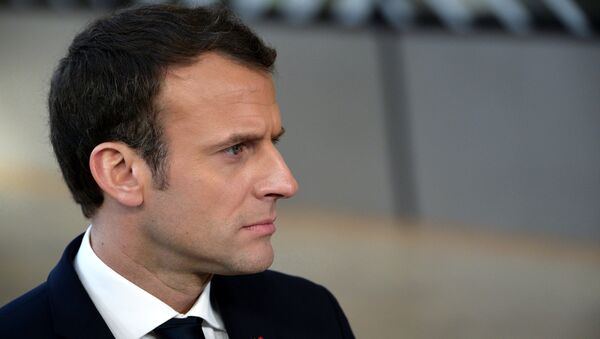Sputnik: President Macron's stance on his internal policy remains unchanged despite the violent protests. Why is the French leader unwilling to meet the demands of the demonstrators?
Socrates George Kazolias: Well if he backs down, it casts doubt on his program, which means investors will think that France is an unstable country they can't really invest in. He's got a project he has to go along with he has promised to do, he believes in capitalism, Europe is a capitalist place, he understands that France will fail if it doesn't reduce its debt and deficit. So he can't really back down, and I think he was hoping that this would fizzle out, but as I wrote over two weeks ago, it could also go sideways very quickly.
READ MORE: One Dead Following Accident at 'Yellow Vests' Roadblock in S France — Prosecutor
Sputnik: The President said it would be his call to make additional decisions in the coming weeks and months. What could the French leader come up, do you think? And why is it taking, in his words, weeks and months? Obviously, that's not going to be palatable for the protesters, considering that these protests have been raging for a couple weeks now?
Socrates George Kazolias: Well I think he was just hoping that this will just peter out, if you remember, there was the national train company that went on strike for about four months this year, and he just let it run its course and went through with his reform, and I think that's what he's hoping to do here. I don't believe he's going to back down, I think he's going to continue with his programmes. The whole question is just how far this movement can go, this social movement. For the moment it's leaderless, but if you get the right person to step in and take over leadership, things could change radically. Macron sort of shot himself in the foot by weakening the unions and weakening the professional associations and so forth, he has found himself with nobody to talk to. There's no leadership here, it's sort of like a medieval peasant revolt on social media or an Arab spring without the Arabs, so he's really in a tough spot here, and I guess he's just trying to hold off, hoping it just fizzles out.
Sputnik: I suppose it's difficult for momentum to continue, so I suppose his strategy is letting it run its course like some of these major disputes, which tend to run out of steam. But the underlying issue, therefore, is that there is still a lot of unrest and unhappiness within the electorate and if this doesn't succeed, there's going to be more to come, by the sounds of things, would you agree with that?
Socrates George Kazolias: I think that Macron has shown the civil servants that he can break their backs, through the train strike and several other strikes which he was able to ride out to push through minor reforms in the civil service. I think that he's hoping that if he can break the back of this movement then other movements will not start. But nature hates a leadership vacuum, and I'm not ruling out that somebody, somewhere could step forward and radically change the whole way this is going. You're right, for the moment there are no leaders so who can the government talk to? I have no idea who those people were who showed up at the Prime Minister's office, who do they represent? Who elected them? Where did they come from? This is a purely grassroots movement of people who just can't take it anymore, who pay more and more and get less and less.
READ MORE: France to Consider State of Emergency Amid 'Yellow Vests' Protests — Spokesman
Sputnik: Mr. Macron's ratings have been falling for quite a while now since he emerged as the president last year; with the latest developments, what political future awaits the French leader?
Socrates George Kazolias: Macron got 23% of the vote in the first round of elections, that represented about France that supported him and even less support him today. Because of the French electoral system, with 23% or 24% of the vote he was able to get an overwhelming majority in parliament because there's no proportional voting here. He never really represented that much, let's not forget he went against Marine Le Pen, so a lot of people voted for him just because they were opposed to Marine Le Pen, although it was one of the highest abstention rates, ever.
Now Macron would like to play a European role, but he can't possibly do that because he's not paying the bills. If France is getting loans at 2% with a debt of 100% of GDP, it is because Germany is footing the bill, it's because Germany is backing the European Central Bank, which is backing the loans. So he's not in a position to impose his will on Europe, even though he has tried. Europeans have just pushed back on all his attempts to federalize Europe, and I don't think the woman who is going to probably get elected to replace Merkel, Kramp-Karrenbauer, I don't think she's going to be any weaker than Merkel, if anything, she's going to be a little tougher fiscally and also she's for increased military spending.
The views and opinions expressed by Socrates George Kazolias do not necessarily reflect those of Sputnik.
Socrates George Kazolias's blog: kazolias.com



